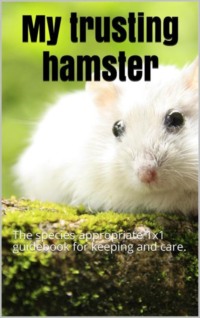Czytaj książkę: «My trusting hamster»
My trusting hamster
Everything around the hamster
By Thorsten Hawk
Content
Everything around the hamster
1. Hamster breeds at a glance
Chinese striped hamster
Djungarian Dwarf Hamster
Gold hamster
Spotted golden hamster
Teddyhamster
Roborowski Dwarf Hamster
History and breeding
2. Which hamster suits me?
3. Cage: correct location and size
4. Bedding and toilet
5. Basic equipment in the cage
Hay rack
Feeding bowl/feeding place
Drinking bottle
Gymnastics equipment, toys and climbing facilities
6. Food and water
7. Fresh food
8. Dry fodder
9. Treats
10. Which foods do not feed
11. Hamster purchase and transport
12. Getting used to the hamster at home
13. How to tame hamsters
14. Correct lifting
15. Care for the hamster
16. Dental care, cutting claws, grooming
17. Sounds and body language
Brushing:
Stretching:
Yawn:
Sharpen teeth:
Crawl flat on its belly:
Squeak:
18. Phasing out and employment
19. Cage cleaning
20. Costs of keeping and purchase
21. Most common diseases and first aid
* eye diseases
* Keraton conjunctivitis
* Cheek pocket injury/blockage
* Bite wounds
* diarrhoea
* Cold
* Fracture
* lice
* Meningitis
* mites
* wet tail disease
* Fungal infestation
* Salmonellosis
* tumor
Everything around the hamster
A compact hamster guidebook, which gives an overview of the individual breeds, shows their differences and peculiarities and summarizes how to keep and care for, feed and keep busy the hamster as a loner. The right equipment to make the hamster feel comfortable is summarized in the most important points.
Since hamsters are not allowed to eat many plants and foods, as these are poisonous or even life-threatening for the animals, a summarizing, compact list is also given. So that you can get to know your animal better, the most essential interpretations of the hamster's body language are also explained.
The most important diseases of the hamster are also described.
However, this list is not intended to replace a visit to the vet, but to create a possibility to recognize changes and abnormalities more quickly, and thus to be able to react immediately.
1. Hamster breeds at a glance
*Chinese striped hamster
*Djungarian Dwarf Hamster
*Goldhamster
+ classic
+ pied, 3-colored
*Teddyhamster
*Roborovski hamster
Chinese striped hamster
color: brown
Weight: 30-40 g
Origin: North China, Mongolia
Specials: very trustful
Personality: trustful, curious, agile, nocturnal, active, lively, playful, likes to climb
Life expectancy: approx. 2 years
Race-characteristics: resembles strongly a mouse, big prominent eyes, slim and bigger than the other types, longer tail (10-13 cm), soft, brown fur, on the underside white (natural coloring), gescheckte and white breeding-forms, eel-line from the back up to the tail-base.
Attitude: The Chinese strip-hamster is like its Artgenossen by nature, a loner and should be held also so. The living together of several hamsters often leads to fights, bite injuries, and can even lead to the death of one or more animals. If you want to keep several hamsters, you need a separate cage for each animal. Also be sure to wash your hands when moving from one animal to another. Hamsters perceive smells very strongly. If they smell the other hamster, you risk being bitten. Therefore, as a prevention, wash your hands well with soap!
